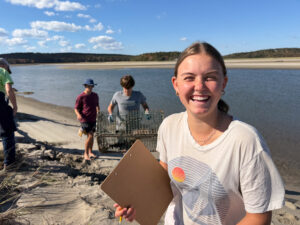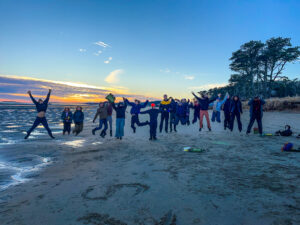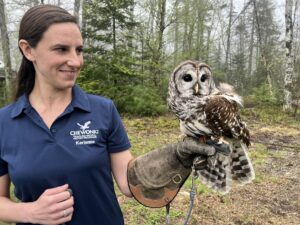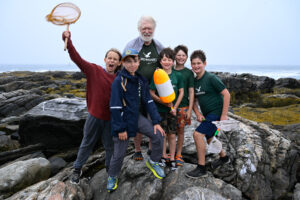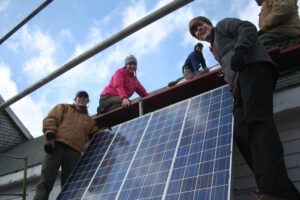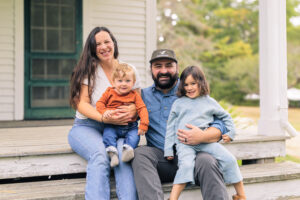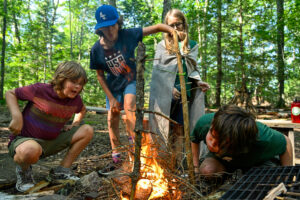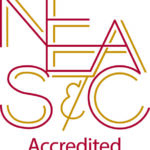When Camp Chewonki summer staff arrived this week, everyone lined up on the Quad in chronological order based on when they first came to Chewonki. Jeff Wells, head of the sailing program, was the very last person in line. He first stepped onto Chewonki Neck in 1968, a few months after Martin Luther King’s assassination and a few weeks after Robert F. Kennedy’s. President Johnson had recently signed the Civil Rights Act. The Viet Nam War was raging. The Rolling Stones and Simon and Garfunkel filled the air waves. He was here to do just what he’s doing this summer: teach boys to sail.

Being at Chewonki during that tumultuous summer “transformed my life,” says Wells. “It touched something deep in me.” He returned for the summer of 1970. Then came a long stretch of years when his life followed different paths, including Harvard, carpentry, ordination in the United Church of Christ, marriage, children. He came back to the Neck in 2015 and 2016, and here he is again, getting ready for a new summer on the water.
“Plus ca change, plus c’est la meme chose,” he says. “The spirit is the same. All the espoused goals of the Chewonki Foundation today: it was not as explicit 50 years ago, but it’s what we did! It was in the air! It was what we were all about.”
Wells grew up in Cleveland, and when he was 16, his father advised him to get some work experience at a camp or a farm. Young Jeff went to the East Cleveland Public Library, asked for a camp directory, found a few camps that offered his favorite sports, sailing and tennis, and sent off five letters. Tim Ellis, then Boys Camp director, responded.
“We were invited to be junior counselors,” Wells says. “Pay was $50 for the summer. Jimmy was an archer. I was a sailor.” He had sailed a lot growing up, both on Lake Erie and along the Maine coast when he visited his grandparents. He admits, however, that he “really learned to sail here,” on the job.

Wells recalls pre-camp in those days as hard work. “We scraped and painted all the boats,” he says. “Six MerryMacs, two Beetle Cats, and one Turnabout.” All campers stayed for the eight-week session, “So everyone really got to know each other.” Chewonki founder Clarence Allen had retired just a couple of years before. “He was still a presence at camp,” says Wells, and whenever the popular educator and camp director stopped by, “He’d always be swarmed.”
Birding is a popular Camp Chewonki activity today but during Wells’s early summers, it was a communal passion. “The bird list was very important to the camp culture,” says Wells. “‘How many have we seen today? What species?’ Some campers arrived with binoculars— real binoculars!– and they immediately began working on the bird list.”
 Wells’s stories of Camp Chewonki in 1968 and 1970 highlight cultural change. Counselors met in the Farmhouse kitchen (now the copier room?) to smoke after hours. “Os-spring” (“Ospreys” “springing”) was popular at the waterfront: campers swam across the creek, clamored up the rocks, and hurled themselves into the water. Campers piled like sardines into “the Green Angina,” a camp truck, for trips to the beach. In the sailing program, “There were life jackets,” says Wells, “but no one ever wore them! We sat on them.” Times have indeed changed.
Wells’s stories of Camp Chewonki in 1968 and 1970 highlight cultural change. Counselors met in the Farmhouse kitchen (now the copier room?) to smoke after hours. “Os-spring” (“Ospreys” “springing”) was popular at the waterfront: campers swam across the creek, clamored up the rocks, and hurled themselves into the water. Campers piled like sardines into “the Green Angina,” a camp truck, for trips to the beach. In the sailing program, “There were life jackets,” says Wells, “but no one ever wore them! We sat on them.” Times have indeed changed.
Wells often has to explain to today’s young staff members that when he first came here, the camp for boys “was the totality of Chewonki.” He still considers it Chewonki’s “heart and soul…the nucleus around which all the other programs have grown.” He is pleased that Chewonki’s growth “has not corrupted or diminished the significance of the Boys Camp.” Rather, the camp spirit has inspired new initiatives.
 Wells has never tired of teaching campers to sail. For him, there is still “magic in using water and air to serve your purpose. The romance of travel and the sea, the idea of novelty and change and new worlds to explore–it’s all there.”
Wells has never tired of teaching campers to sail. For him, there is still “magic in using water and air to serve your purpose. The romance of travel and the sea, the idea of novelty and change and new worlds to explore–it’s all there.”
Wells lives with his wife, Kim, in St. Petersburg, Florida, but something made him want to take the long trip north for another Chewonki summer, 50 years after his first. “I love being here,” Wells says. “It’s a very special place.”
